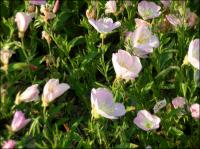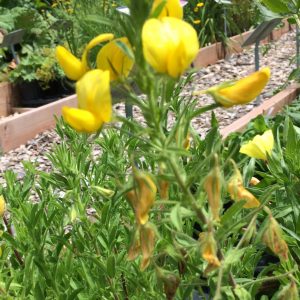Archives
- Sorry, this product cannot be purchased.
Showing 121–128 of 199 results
-
Melampodium leucanthum Blackfoot daisy Z 5-10
No fail low mounds of up to 50 small white daisies spring-fall, atop narrow, hairy, grey-green leaves
ARCHIVED
Note: This is a plant not currently for sale. This is an archive page preserved for informational use.
No fail low mounds of up to 50 small white daisies spring-fall, atop narrow, hairy, grey-green leaves
Size: 6-10” x 12-20”
Care: sun to part-shade in well-drained soil. Its tap root reaches down for moisture and hair on foliage protects if from desiccating winds and sun - xeric plant
Native: Colorado, Oklahoma, TX &AZ (no wonder it likes well drained soil) but perfectly happy as far north as 20° below zero in winter.
Wildlife Value: birds eat seeds –pollen and nectar attract bees and butterflies. Deer resistantBotany professor John Riddell found this in Texas, Described in Flora of North America, 1842.
-
Minuartia larcifolia Larch leaf sandwort Z 5-8
White blooms May-June over needle-shaped foliage
ARCHIVED
Note: This is a plant not currently for sale. This is an archive page preserved for informational use.
White blooms May-June over needle-shaped foliage
Size: 4-5” x 12-15”
Care: sun to part shade in moist well-drained to well-drained soil
Native: Mountains from Austria to SpainCollected before 1753.
-
Monarda bradburyana Eastern beebalm, Bradbury’s Monarda Z. 5-8
Whorls of pale pink hood-shaped petals with dark purple spots, April to June.
ARCHIVED
Note: This is a plant not currently for sale. This is an archive page preserved for informational use.
Whorls of pale pink hood-shaped petals with dark purple spots, April to June.
Size: 18-24" x 24"
Care: sun to part shade in moist well-drained to well-drained soil. Walnut toxicity resistant.
Native: IL west to KS, south from AL to TX
Wildlife Value: attracts butterflies and hummingbirdsNamed for its collector, Englishman Bradbury who searched for plants in central No. America in 1810. In gardens by 1826.
-
Myosotis palustris syn. M. scorpioides Forget-me-not Z. 5-9
Small gentian flowers with golden eyes, spring into fall
ARCHIVED
Note: This is a plant not currently for sale. This is an archive page preserved for informational use.
Small gentian flowers with golden eyes, spring into fall.
Can not ship to: New Hampshire
Size: 9-12” x 12”
Care: sun to part shade in moist soil
Native: temperate areas world wide“Myosotis” is Greek meaning mouse ear for the leaf shape. Around 1390 Henry IV adopted soveigne vous de moy, Forget-me-not, as a symbol not to forget his reign. A German legend attributes the common name to a lover who, gathering the flower, cried out “forget-me-not” as he fell into the river and died. Alfred Lord Tennyson wrote: “The sweet forget-me-nots; That grow for happy lovers.” Persian poet Shiraz told another folk tale: an angel fell from heaven by falling in love with a “daughter of earth,”when they sat by a river twining Forget-me-not flowers in her hair. The angel was not allowed to return until the lovers planted Forget-me-nots in every corner of the earth, which they did, hand in hand. She then became immortal “without tasting the bitterness of death” and joined the angel in Paradise.
-
Nepeta nervosa Catmint Z 4-9
Chubby spikes of many clear blue-purple flowers blooming June-September. Deadhead to rebloom
ARCHIVED
Note: This is a plant not currently for sale. This is an archive page preserved for informational use.
Chubby spikes of many clear blue-purple flowers blooming June-September. Deadhead to rebloom
Size: 16-20” x 18-24”
Care: sun in moist to moist well-drained soil
Native: China
Wildlife Value: deer & rabbit resistant, attracts bees & butterfliesNepetas may have been named after Nepete, an old Etrusrian city. Nervosa means with conspicuous veins. Collected before 1833.
-
Oenothera speciosa Evening primrose Z 5-8
June to August pale pink saucer-like blossoms
ARCHIVED
Note: This is a plant not currently for sale. This is an archive page preserved for informational use.
June to August ballerina pink saucer-like blossoms, excellent groundcover.
Size: 12" x 12" spreader
Care: Full sun moist well-drained to well-drained soil
Native: Southwest U.S. to MexicoAnother Thomas Nuttall discovery – 1819.
-
Ononis natrix Yellow restharrow Z 4-8
Yellow pea like flowers with red veins June- August
ARCHIVED
Note: This is a plant not currently for sale. This is an archive page preserved for informational use.
Yellow pea like flowers with red veins June- August
Size: 12” X 12”
Care: sun in dry soil
Native: Syria, Lebanon, Palestine, Jordan, Egypt, Tunisia, Algeria, Morocco, Circum-MediterraneanLinnaeus 1753
-
Papaver orientale ‘Beauty of Livermere’ Z 3-9
Glossy fire engine red petals with black heart in June.
ARCHIVED
Note: This is a plant not currently for sale. This is an archive page preserved for informational use.
Scarlet, tissue-thin petals surround a purple blotch at the base highlighted with purple stamens
Size: 3' x 2'
Care: sun in well-drained soil. Foliage dies back in summer & reemerges in the cool autumn.
Wildlife Value: Attracts hummingbirds, bees & butterflies. Deer & rabbit resistant.This red selection listed in Matineau’s book 1910





